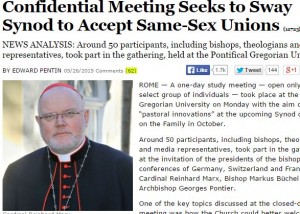There’s a prayer in the Divine Office that asks
Teach us to work for the good of all,
whether the time is right or not;
make your Church a welcome light for
the whole human family.
Am I a welcoming light? When I speak and write and teach about the Church, do I draw people in, or push them away?

I listen to a lot of presentations to Catholics with children in religious education. Many of those Catholics aren’t serious about, or even practicing, their faith. The speakers try to present a reason for re-engaging that faith, and though their points are correct, the tone often is flat and even off-putting. There’s nothing to draw people in to the life and joy of the gospel, which can only really be lived in its fullness in the Church. If I was not already a regular mass-goer, little in those presentations would convince me to show up on Sunday.
We are commanded to always be prepared to give a reason for our joy, but do we? Do we even feel the joy? Do we know our reasons? When we speak of our faith, is it a lived thing of hope and goodness, or simply another American ideological splinter group?
The internet once seemed to be full of grand possibility for evangelization and faith formation. It certainly helped me make friends, develop my prayer life, and deepen my understand of the faith by interactions with knowledgeable people. There’s still a lot of that out there. Fr. Barron, Jimmy Akin, Scott Hahn, and many others continue to be welcoming light for many: firm and orthodox in their teaching, but radiating peace and joy in the truth of the faith.
But the divisions in the American church become stark and aggressive in the amplifying environment of the internet. Every parish has their cranks, but now those cranks set up blogs and attract thousands of readers who flock to read insults and invective. Pride leads both dissidents and traditionalists into ego-driven acts of exclusion.
We hold our truths in a tension that doesn’t sit well on any ideological spectrum. There may be truth in the particulars of a rant against, for example, the gay agenda or the use of torture, but what is the total effect of that rant?
The truth serves a purpose, which is to lead others to it. Jesus himself was told “This is a hard truth; who can hear it?” The goal is to have those who listen embrace the completeness of the truth. Some truths are hard, and they don’t get any easier by wrapping them in euphemism.
And, of course, they cannot compromised.
But the real distinction isn’t a matter of whether what you’re saying is right or wrong. If we’re saying something that conforms to the teaching of the Church, then it is always right. The question is whether it is effective or ineffective.
This instantly raises another question: effective for what?
Obviously, everyone has their own reason for writing or speaking about the faith in public. Some are working through their own doubts and troubles, some are evangelizing, some are teaching or defending, some are just expressing their joy at a life in Christ. There is certainly no shortage of error in the world and the Church that needs to be confronted and corrected lest it lead others into error. But there is a fine line between addressing something that needs to be corrected, and just wallowing in hatred and fear. And fear has become the dominant emotion of way too many public Catholics.
Imagine, for a moment, that you are the only Catholic a person will encounter, either in real life or in something you’ve written or shared on the internet.
Will that person, who either knows nothing of the faith or has fallen away, see the Church as something of power and truth and love and happiness in what you say or do or share?
I’m not asking if they’ll agree with you. Since people in the modern world are conditioned to accept lies as truth, persuasion is another, more difficult matter. I’m asking if that person will see the light of Christ shine through you in spite of, or perhaps even because of, your expression of a hard truth.
When Jesus was confronted over his “hard saying,” he replied that his words were full of spirit and life. Ours must be as well.
The first step in being a Christian is to repent and believe in the Gospel. Neither of those things is easy, and there may be years of struggle hidden in that little word “and” before people succeed. Conversion is a process, and those of us who are further along in the journey need to find the most effective ways to accompany those still in the dark woods or on the rocky path.
We need to let the spirit and life of Christ shine through us, so we can be a light others will want to follow.











